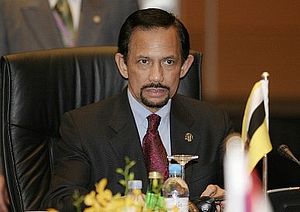Later this year, a joint venture between Brunei and China in aquaculture will be added to the list of many projects being deliberated under the Brunei-Guanxi Economic Corridor (BGEC).
The BGEC is a direct supply link established in 2014 aimed at boosting Brunei-China bilateral trade and investment.
According to local media reports, the joint venture (JV) will be known as Hiseaton Fisheries (B) Sdn Bhd. Apart from an aquaculture farm, the mainstay of the project, it will also include a hatchery, a processing factory, and a research development center. Pompano fish will be imported from China, raised and processed in Brunei and potentially exported to the United States and Middle East. Acting Director of Fisheries Department Abdul Halidi Salleh said that the JV is expected to create 100 jobs and occupy 2,000 hectares of Brunei’s offshore aquaculture sites.
According to Brunei’s minister of primary resources and tourism, a Bruneian government-linked company has inked a deal with China-based Guangxi Hiseaton Foods to operate the offshore aquaculture farm, to be located in the Bruneian coastal waters of Pelong Rocks. A tenancy agreement for the JV to operate the research development center in Meragang, Brunei was also signed between the Director of Hiseaton Fisheries (B) Sdn Bhd Liu Xi Lei and Acting Director of Fisheries Department Abdul Halidi Salleh.
The Bruneian government’s willingness to host Chinese investment is part of its larger push to diversify its oil export-driven economy. It is presumably also done in hopes that the entry of big aquaculture company Hiseaton Foods will spur more international investors. A separate 4,624-hectare site at Littledale Shoals is also being opened for proposals.
Chinese Ambassador to Brunei Yang Jian told The Brunei Times that Guangxi province is looking at the possibility of starting a small industrial park in Brunei, similar to the Kuantan Industrial Park that was established in Malaysia.
Brunei’s urgent need to save itself from the fiscal perils of the resource curse has seen the sultanate embark on efforts to boost trade and investment. This has played nicely into Chinese efforts to win ASEAN allies for its own interests, including in the South China Sea, as evidenced by Beijing’s alleged four-point consensus with Brunei, Laos, and Cambodia earlier this year. Notably, Brunei, unlike Laos and Cambodia, has its own claims in the South China Sea.
More commercial deals bagged at the China-ASEAN Expo slated for this September – which is unlikely to be adversely affected by a much-anticipated arbitration ruling on a Philippines-China case involving the South China Sea – will serve as a good indicator of Brunei’s progress toward achieving its development plan, Vision Brunei 2035.
The tiny sultanate of Brunei, located on the western coast of East Malaysia, has 16,000 hectares of offshore aquaculture sites available. In response to low oil prices and depleting reserves, the Brunei government has in recent years made a concerted push to diversify its economy into non-oil industries such as the premium halal food market, Islamic finance, and tourism, but faces stiff competition from neighboring Malaysia, high cost of living, and regional economic headwinds.

































